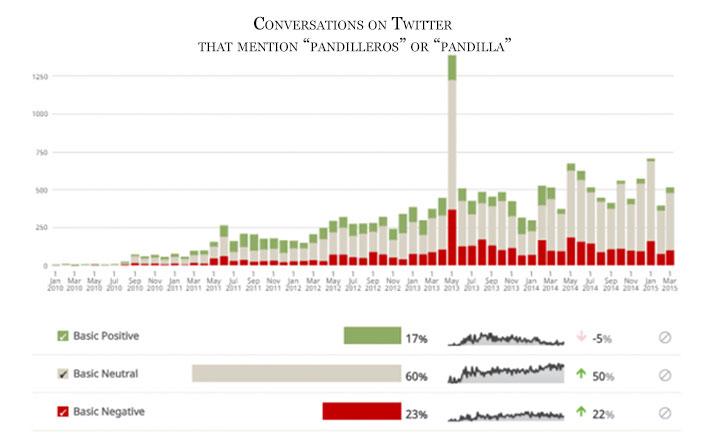
Social media analytics on crime and violence in Honduras. The colors represent the sentiment -- positive, negative or neutral -- associated with the context in which the words pandilleros (gang members) and pandilla (gang) were used.
The words “crime” and “violence” seemingly go together when talking about the Northern Triangle countries of Central America (El Salvador, Honduras and Guatemala). The words “data” and “hackathon” go together when discussing technical innovation, intricate computer applications and groups of hackers writing computer code to create the next billion-dollar application. Rarely do these four words merge on the same plane, but when they do, opportunities abound for conversations that have lots to do with innovation and more to do with citizen security and social development. I had the opportunity to take part in such conversations during a USAID-organized hackathon on April 30 and May 1, focusing on security levels in Central America and the Caribbean.
The event brought together data scientists, programmers, designers and Latin America experts to find innovative ways to look at crime and homicide rates in the region, and try to find a solution to some of the causes of these maladies. But what is a hackathon you ask? It’s an event that brings together a group of people to find solutions to an specific problem. My group did just that with our main task: to analyze the extent to which social media analytics can be used as a public opinion tool by academics, civil society and local governments to assess the perception of violence in Honduras.
Using a platform called Crimson Hexagon, we searched Twitter data for words such as pandilleros (gang members) and pandilla (gang) to generate insights about drivers of positive or negative sentiment and identify trends in how those keywords drove digital conversations. Our analysis found, for instance, that in May 2013 there was a spike in conversations referencing pandilleros and pandilla, which we linked to a gang truce announced by the prominent gangs in Honduras, Mara Salvatrucha and Barrio 18. Another interesting insight was that tweets seldomly associated the word droga (drug) with pandilla, two words that have been intricately used in the war on drugs rhetoric.
Although our findings are not scientific, we achieved our goal of generating new insights into the decade-old security problem affecting Honduras and its Central American neighbors. In a way, that was the main goal of the hackathon -- to open our minds to see beyond current perceptions of violence and insecurity and find ingenious ways to address underlying problems. Central America needs accountable governments, security and public sector funding, and social investment in civil society -- that is not up for debate. But the region also needs a fresh point of view that combines innovation, social media tools and technological terms with public security to achieve a greater goal.
Blog reposted from NDItech.org
